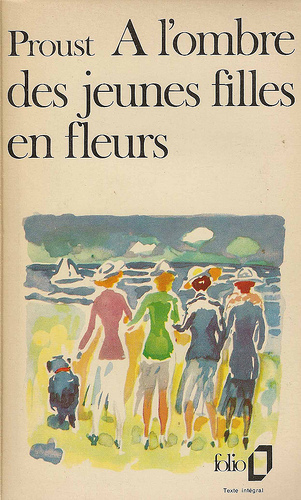Folio turns 40

BY ADRIAN TAHOURDIN
Folio turns forty this year. For all lovers of French literature this should be a cause for celebration, as this imprint of the publishers Gallimard could be said to be the French equivalent of our Penguin paperbacks. Folio's competition in the paperback market has come principally from Flammarion and of course Livre de Poche, the distinctive collection published by several different firms. Livre de Poche still has an evocative post-war charm, but its volumes have not physically aged well: all too many of my Livres de Poche, from La Princesse de Clèves to Le Silence de la mer, have cracked spines and yellowing pages that threaten to fall apart on contact, like some medieval parchment (probably not helped by the fact that I picked up quite a few of them second-hand). Folios, with their white backgrounds, solid spines, excellent cover illustrations and reader-friendly type, have always been a pleasure to handle and to read – the perfect paperback in fact.
Which is not something I've often felt about Flammarion. I have on my shelves quite a few Flammarions – they must have been cheaper than Folios – but, I wonder, would I have enjoyed reading those books more if I'd possessed the Folio edition? When I embarked on Laclos's Liaisons dangereuses, Flammarion edition, I struggled at first with its characteristic dense type and narrow margins. I switched to the Folio edition (over a hundred pages longer, and with a Preface by André Malraux), and breezed through it.
In the case of Rousseau's Confessions, I see that I have the first volume in Flammarion, while for the second one I knowingly went for the Folio edition. I clearly took no chances with Stendhal's Le Rouge et le Noir as I have two copies: the Folio with a Preface by Claude Roy (700pp) and the Livre de Poche, with a short Introduction by Roger Nimier (512pp).
Further along my shelf is a Flammarion edition of Théophile Gautier's Voyage en Espagne which I bought when I spent a year at the University of Aix-en-Provence (from dreary London to balmy Aix). As an "auditeur libre" I was free to attend whichever course of lecture/seminars I fancied, one of these being the appealing-sounding "Flâneries esthétiques" (rather more imaginative than the monolithic "Racine" or "Camus" I had been offered at uni back in Blighty). First on the reading list was Gautier, but I regret to say it remains unread by me to this day, partly on account of its unattractive layout. I attended that course long enough to hear my fellow French students being berated by the prof for poor style, spelling and punctuation (never mind the content) as she handed them back back their first essays (being a foreign student I was excused from having to do any work at all).
Folio saw me through my university special paper on André Gide: I have half a shelf of his books in Folio and I see that my copy of the autobiography Si le Grain ne meurt is thick with marginal "NBs", at one point eight in seven pages: how helpful was I really being to myself with such undiscriminating marginalia?
The most intense and exhilarating reading experience I've had was in Folio: staying up half the night three days running to read Proust's A l'Ombre des jeunes filles en fleurs before moving straight on to Le Côté de Guermantes. I like the fact that my Folio edition of Proust has no introduction, preface or notes – just the text. And there is the added pleasure of the cover illustrations by Kees Van Dongen. Frustratingly my copy of Albertine disparue doesn't have a Van Dongen cover, as I lost it and had to replace it; I therefore don't have "the set".
Aside from my magically unannotated Proust I have a set of Folio Camus books which are also, surprisingly, without any critical material, and I don't mind. But the editorial policy seems to have been random: Michel Tournier's masterpiece Le Roi des aulnes comes with a "Postface" (postscript) by Philippe de Monès. Who is Philippe de Monès I wonder? The same author's Vendredi ou les limbes du Pacifique also has a (long) "Postface", by Gilles Deleuze this time. I had no idea who Gilles Deleuze was either when I read that novel. I wonder if I ever read his postscript.
To read the TLS review of My Fantoms by Théophile Gautier from 1976, click here
Peter Stothard's Blog
- Peter Stothard's profile
- 30 followers



